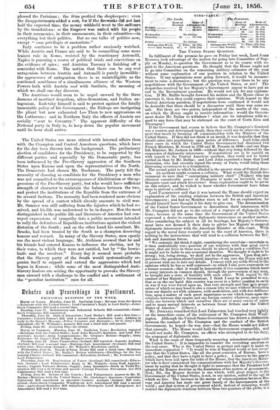The United States are more stirred with internal affairs than
with the Crampton and Central American questions, which have for the day been thrown into the background. The preliminary election of candidates for the Presidency, to be supported by the different parties and especially by the Democratic party, has been influenced by the Pro-Slavery aggression of the Southern States upon Kan:Las and upon the representatives of the North. The Democrats had chosen Mr. Buchanan. The party felt the necessity of choosing as candidate for the Presidency a man who was not committed to the extravagances of Abolitionism or the ag- gressions of the Pro-Slavery party, but who would have sufficient strength of character to maintain the balance between the two, and protect the institutions of the Republic from the extremes of its several factions. The neoessity had been rendered more obvious by the spread of a contest which already amounts to civil war. Mr. Sumner was still suffering from the injuries which he had re- ceived, and his life was understood to be in danger. Men the most distinguished in the public life and literature of America had con- veyed expressions of sympathy into a public movement intended to rally the defenders of Republican institutions against the violent dictation of the South ; and on the other hand his assailant, Mr. Brooks, had been treated by the South as a champion deserving honour and reward. In many of the Slavery States, men openly use the most violent language. Mr. Atchison avowed that he and his friends had entered Kansas to influence the election, not by their votes, to which they were not entitled, but by "the bowie- knife and the revolver." Every day it seemed more probable that the Slavery party of the South. would systematically or- ganize itself to support and extend the aggressions which had, begun in Kansas ; while some of the most distinguished Anti- Slavery leaders are seizing the opportunity to provoke the Slavery men onward with a challenge to the conflict and a settlement of the "peculiar institution" once for all.


























 Previous page
Previous page